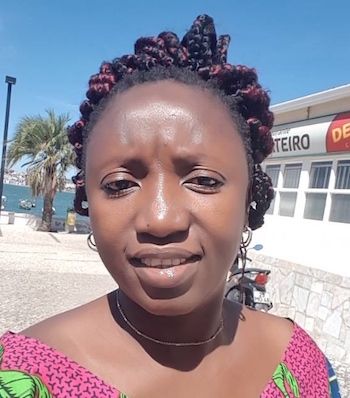Justina Conteh

Summary: Justina Zainab Conteh leads an NGO that provides care and assistance to children—mostly girls—who are homeless because of, e.g., disease, sexual abuse, or abandonment. SGF provides these children with counseling, medical and legal assistance, education, and a safe place to live for a year, after which the children are reunited with their families or provided with foster families. Conteh is continually sexually harassed herself and has to fight traditional norms that oppress females.
Profile: Many children—particularly girls—in Sierra Leone need help, for a variety of reasons. Justina Zainab Conteh, through her organization, the St. George Foundation (SGF), provides that help. Here’s how it works:
SGF staff search the streets for children (mostly girls) who are homeless—due to, e.g., disease, sexual abuse, or abandonment—and bring them to their center. There the children can live for up to a year. They are given clothes and medical care. They are fed well. They are introduced to healthy, “normal” everyday activities, such as singing, dancing, and playing football. They bond with one another. They learn to cook and clean. They attend a local school and receive tutoring. They are given legal assistance. They are encouraged to go to a church or a mosque. They are interviewed and counseled. After a year, they are either returned to their natural families or provided with foster families; the counseling and education continue.
In short, they are protected and cared for. Since its inception in 2004, SGF has done this for more than 1,900 children.
Conteh’s job is not easy. During the Ebola outbreak, Conteh managed an interim care center that was quarantined twice. A coworker contracted the disease and died. And there are man-made threats as well, threats that help her identify even more with the girls she protects: Men constantly proposition her, families harass her, and many traditional parts of Sierra Leonean society discourage education for girls. Sometimes the sexual bias merges the personal and business sides of her work.
“As a woman in the kind of work we do,” says Conteh, “we face a lot of challenges . . . some men would ask for sexual favor . . . 80% of female leaders in different fields suffer from this sort of harassment. Most times, you either lose money or your proposal ends up in the dust bin.” Not only that, but “Sometimes a perpetrator of a rape case with some money can grease the palm of a local chief and parents of a victim, for an out-of-court settlement . . ..”
Conteh tries to coordinate with both governmental and private organizations—the Ministry of Social Welfare, Gender, and Children’s Affairs, Defense for Children International, Advocacy Movement Network, and Family Homes Movement, to name a few—in order to remove obstacles to girls’ physical, emotional, educational, and economic health. Still, she says, “little or nothing comes from our government in terms of support.”
Despite the personal threats, the governmental inaction, and the societal pressures, Conteh persists. She and SGF “envision a country where women and girls are free and are in a position to stand up for their rights, be change-makers, with full support from the community and policies.”
